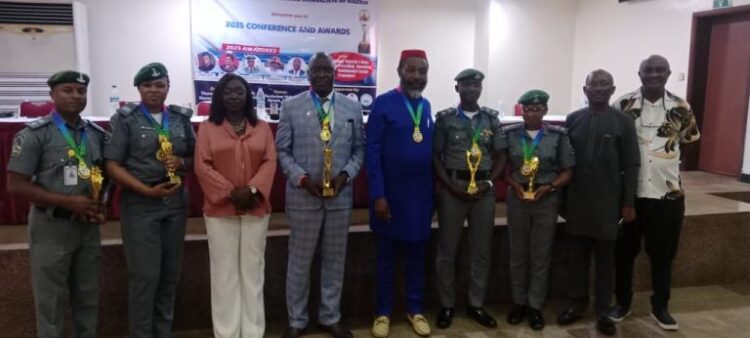At the 2025 Annual Conference and Award Ceremony of the Association of Maritime Journalists of Nigeria (AMJON), the Nigeria Customs Service (NCS) reaffirmed its commitment to modern trade facilitation through technology. Representing the Comptroller-General of Customs, Dr. Bashir Adewale Adeniyi, MFR, the Public Relations Officer of the Lagos Free Trade Zone Command, CSC Abdullahi Lagos, presented an illuminating paper on “B’Odogwu as Game Changer for Optimal Trade Facilitation: The Journey So Far.” His presentation underscored how the NCS’s homegrown innovation, B’Odogwu, is revolutionizing Nigeria’s port and border operations, placing the nation firmly on the path toward global competitiveness.
In his remarks, CSC Abdullahi Lagos described B’Odogwu as “more than software—it is the digital backbone of a modern customs administration.” Designed under the visionary leadership of Comptroller-General Bashir Adeniyi, the B’Odogwu Unified Customs Management System integrates all major customs processes, from Form M, PAAR, Single Goods Declaration, manifests, and duty payments to cargo release llwithin one intelligent, web-based platform.
Beyond its operational power, B’Odogwu is built to connect seamlessly with other critical agencies such as the Central Bank of Nigeria (CBN), SON, NAFDAC, FIRS, and commercial banks. This, according to Lagos, marks “an unprecedented level of inter-agency integration” aimed at eliminating duplication, reducing bottlenecks, and enhancing transparency.
The Nigeria Customs Service, through B’Odogwu, is aligning with international obligations like the World Trade Organization (WTO) Trade Facilitation Agreement, the African Continental Free Trade Area (AfCFTA), and the NCS Act 2023. These frameworks demand trade systems that are faster, predictable, transparent, and data-driven—goals that B’Odogwu squarely delivers.
Since its pilot phase at PTML Terminal in late 2024, where over 16,000 declarations were processed, the system has expanded to major ports including Apapa, Tin Can Island, Onne, and Lagos Free Trade Zone. Today, several commands are fully operational on the platform.
The results, Lagos revealed, have been transformative. Average clearance time has dropped dramatically, with some compliant importers completing documentation and cargo release within 4 to 8 hours. Dwell time has reduced, revenue generation has improved, and the system’s digital footprint has curbed human interference and corruption.
“B’Odogwu strengthens compliance and accountability by design,” he emphasized. “It uses data intelligence to distinguish low-risk from high-risk shipments, ensuring compliant traders enjoy expedited processes while Customs focuses enforcement where necessary.”
Acknowledging that reforms of such magnitude naturally face teething problems, the Customs PRO noted issues such as initial system slowdowns, connectivity gaps, and adaptation difficulties among users transitioning from NICIS II. However, he assured stakeholders that the Service had implemented continuous system upgrades, strengthened coordination with partner agencies, and intensified user training.
In a passionate appeal, Lagos called on maritime journalists to play their critical role in shaping public perception and understanding of the reform. “B’Odogwu needs accurate interpretation, not misinformation,” he stressed. “Journalists are the bridge between policy and the people, helping to explain reforms, highlight challenges, and sustain accountability.”
To sustain the reform momentum, the NCS is focusing on:
- Nationwide rollout completion
- Strengthened inter-agency harmonization
- Continuous capacity building and user support
- Media partnership and stakeholder engagement through platforms like AMJON
With B’Odogwu now operational across key trade corridors, the Nigeria Customs Service is redefining the future of border management. The initiative is not only reducing cost of doing business and attracting investment, but also positioning Nigeria as a leader in customs modernization within West Africa.
“B’Odogwu is not just a system, but a statement that Nigeria is ready to compete globally,” Lagos concluded. “With continued stakeholder collaboration and media support, our journey toward a smarter, technology-driven trade environment is unstoppable.”














